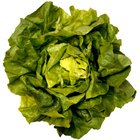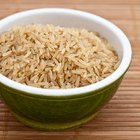
bhofack2/iStock/Getty Images
The tomatillo is a green, tomato-shaped vegetable covered by a papery husk native to Central America. Latin American foods often feature the tomatillo. The green ingredient in salsa verde, it provides a tart, spicy flavor to foods. The husks are often included in tamale dough. The tomatillo offers a variety of nutrients that provide health benefits.
Low in Calories
One cup of chopped tomatillos provides 42 calories, or 2 percent of a standard 2,000-calorie diet, and just 1.3 grams fat. Because of its low calorie content, you can use tomatillo to increase the volume of your meal, so you're likely to feel more satisfied, without significantly increasing your calorie intake.
Vitamin C
A 1-cup serving of chopped tomatillos provides vitamin C 15.4 milligrams -- 17 and 21 percent of the daily recommended intakes for men and women, respectively. Needed for the production of collagen, vitamin C supports the health of skin tissue, including the repair of organs, blood vessels and the skin. It also promotes general wellness because of its antioxidant function, because it shields your cells from damage.
Fiber
The fiber content in 1 cup of tomatillos is 2.6 grams of fiber, or 10 percent of the daily fiber needs for women and 7 percent for men. Fiber is a nutrient in the diet important for providing the bulk in stool that facilitates regular waste elimination. It also improves digestion of carbohydrates by slowing their disbursal into the small intestine and bloodstream, lowering the instance of blood sugar fluctuations that contribute to diabetes.
Niacin Content
Tomatillos also add to your daily niacin intake. You need just a small amount of niacin daily, and each cup of chopped tomatillo provides 15 percent of the daily needs for men and 17 percent for women. Eating niacin helps support your metabolism, because your cells need it for chemical reactions that convert food into energy. It also supports tissue function by promoting cellular communication.
Related Articles

Nutrition Information on Blueberries

Vitamins for Mental Alertness

Nutritional Benefits of Butter Leaf ...

The Nutritional Value of Edamame Beans
Portillo's Chopped Salad Calories

Nutritional Value of String Beans

What Are the Health Benefits of Fresh ...

What Is the Nutritional Value of ...

Skin Care Products That Contain ...

How to Cook Papaya Pear Squash

How to Get Rid of Purple Scars

How Many Calories Are in Butternut ...

Bok Choy Nutrition

How to Glaze or Sweeten Canned Carrots

What Vitamins Help the Liver?

What Is Agave Syrup?

What Are the Health Benefits of Pico De ...

How to Blanch Tomatillos

Food Sources of Betaine

Nutrition Facts for Cooked Poblano ...
References
Writer Bio
Based in Richmond, Va., Tara Carson has written articles for editorial and corporate online and print publications for more than 10 years. She has experience as an adjunct professor of nutrition at Northwest Christian University and holds a Bachelor of Science in journalism and nutrition from Virginia Commonwealth University.
Photo Credits
bhofack2/iStock/Getty Images